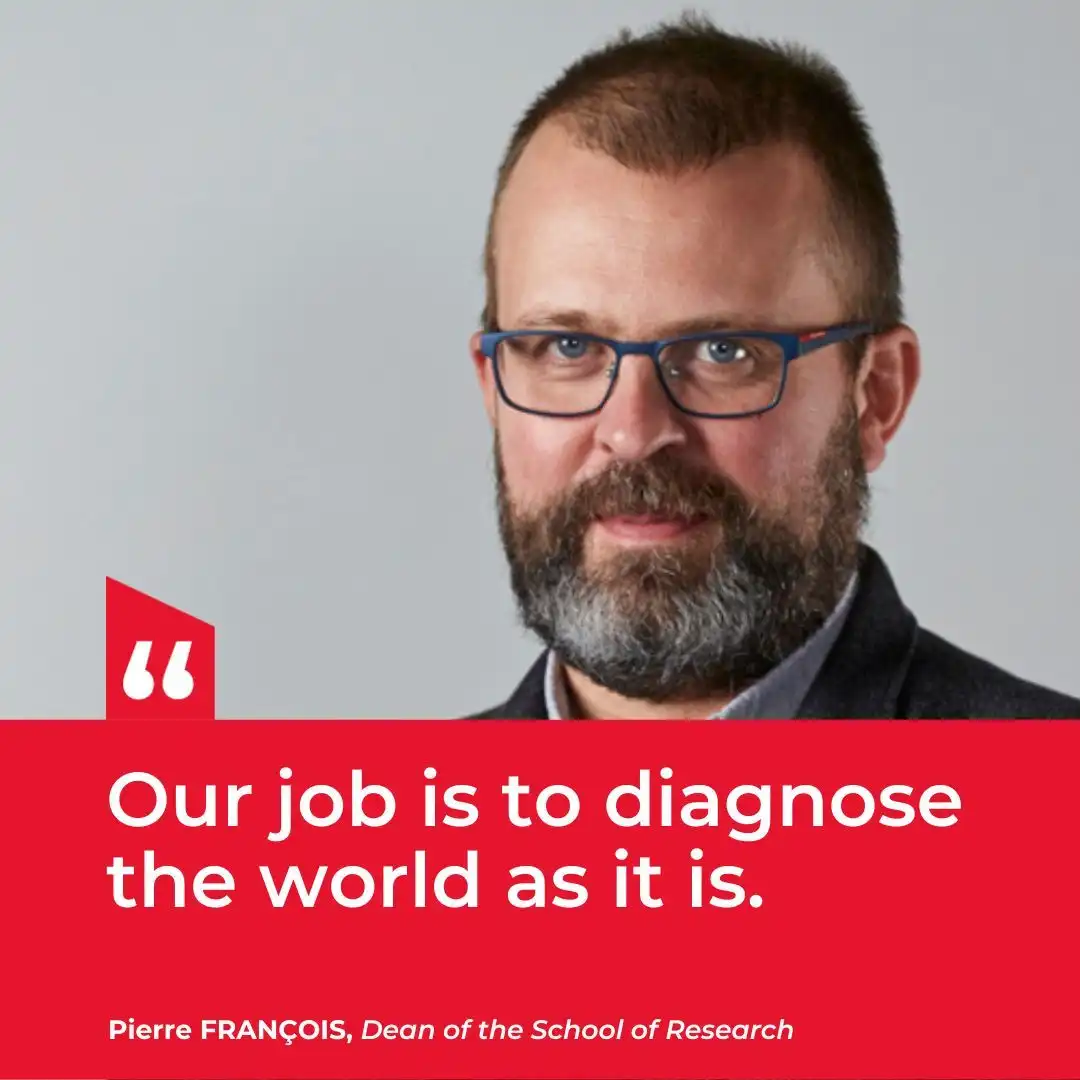Home>Research Studies: What is their purpose?
25.01.2021
Research Studies: What is their purpose?
Pierre François, Dean of the School of Research (formerly the Doctoral School) reflects on the specificities and advantages of research training, a vocation that has become more essential and demanding than ever in the context of the global health crisis that is disrupting “the day-to-day routine of the social sector.”
You are the Dean of the School of Research, formerly known as the Doctoral School. Why change the name?
Pierre François: The name change is first and foremost a matter of clarification: we wanted the name of the school to more closely reflect reality - it is a graduate school that delivers both master’s and doctorate degrees. More specifically, we train in research, which means that we do not only train for a doctorate, but for many other professions. Those of our students who enter the job market directly after their master's degree excel professionally, even in the current context. This is not a coincidence: we teach students how to conduct research within a variety of careers, which is an invaluable skill and professional asset.
What do students learn at the School of Research?
Pierre François: You learn to speak, read, write and count! Ok, I'm oversimplifying, but what I mean is that our students learn to master these four skills at an exceptionally high level. They learn to speak in a clear, developed, and accurate manner. They learn how to read and write long, complex texts in different languages. They learn how to calculate and mathematically model social phenomena as well as understand and interpret their results. Our graduates stand out because they excel in these four domains at once. It’s a pretty rare mix, not to say exceptional, especially with such a degree of expertise. But don’t be fooled, the profession for which they are training is hard and learning its intricacies is equally challenging. The choice to pursue research studies should be well thought-out, and motivated by a genuine desire to study social sciences.
What does the School of Research have in common with similar schools abroad? What are its specificities?
Pierre François: Our organisation by disciplines aligns with international standards, as does our recruitment: today, 50% of our student body is international. Our progress in this regard has been fast and quite spectacular. Our originality is the flexibility of our courses: students can enter a master's degree and go on to pursue a thesis or not, either at Sciences Po or elsewhere. At the PhD level, we welcome students from all walks of life. It is a singularity and a major asset that I witness every day, alongside pluralism which is in our DNA.
How is this pluralism reflected in the school’s mission/educational values?
Pierre François: For a start, it is deeply ingrained in the subjects of our research, thanks to our large and diversified faculty. But it is also a theoretical and methodological pluralism. At Sciences Po, we have a permanent faculty stemming partly from traditional social sciences “à la française”, and partly from international social sciences. Thanks to this, we can offer the best of both traditions. We also set a high and very rigorous barrier to entry for research subjects, with the possibility of an interdisciplinary dialogue surrounding timely common themes such as the environment, migration, inequalities, and financial regulation.
What does studying social sciences mean? And what does it mean to study them at Sciences Po?
Pierre François: The history of social sciences and the history of Sciences Po are intrinsically linked. The social sciences in their modern, contemporary form were born in the last third of the 19th century around political and social issues which led to the foundation of Sciences Po. Namely, the desire to question the various challenges of society using scientific tools on the ground. 150 years later, Sciences Po takes its role in the production of social sciences in France and around the world very seriously - as well as its role in training future researchers who will produce the knowledge of tomorrow. The School of Research is at the heart of this. We work with facts, with precise and rigorous methods, including recognising that sometimes you just don't know. Our job is to diagnose the world as it is. It is an empirical school, with all the arduousness that such a term implies. But our strength lies in this level of rigour.
What is the impact of the multiple and deep crises that we are experiencing in research studies?
Pierre François: These crises are placing students immediately in a situation that any researcher will inevitably encounter in his or her career, but which usually arises later, in a less intense and brutal manner. It is not uncommon to have to adapt drastically the way in which one conducts research. In fact, it's even normal. However, in this particular context, students of research have to frequently adapt, immediately, urgently, and without a lot of professional experience. It is very challenging - but also very instructive - to go through these difficult times during studies.
From a more general point of view, we are faced with times in which we leave the day-to-day routine of the social sector, a way of life to which we are accustomed. The multiple crises that are affecting us take us out of this routine. Practical intelligence no longer works. We need a slower, information-fed intelligence that allows us to understand the social world that has given rise to these crises. Trying to figure things out in the midst of the crisis doesn't work. In contrast, this is the purpose of social sciences: to offer chains of intelligibility that we do not have time to produce in the midst of the storm. This is why they are needed more than ever.
Interview by the Sciences Po Editorial Team
More information
